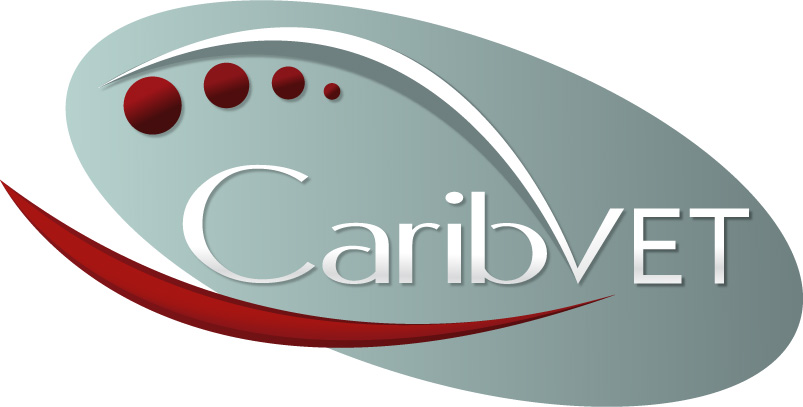Exchanges & sharing of experience - WP3
Objectives
- Ensuring a better integration of the Guadeloupe research teams in the ERA.
- Building long-lasting networks with European partners allowing in particular for applying together to FP7/FP8 calls
- Sharing and exchanging experience through 2-way secondments, visits and training sessions
- Involving the CaribVET network in the loop
Description of action
Short and long term visits in Guadeloupe and Europe
Short-term visits will allow for discussing the strategy for further collaborations between the different partners and building of new European projects and networks and will participate to training of Guadeloupe researchers.
These visits will be both visits from European partners to Guadeloupe and visits from Guadeloupe researchers to Europe:
(i) Short-term visits with iBET/ITQB. Three researchers from Guadeloupe will take the opportunity to participate to COST action meetings on “European farm animal proteomics” or other workshops during visits at iBET/ITQB.
Four visits will be performed involving 2 permanent scientists (2 visits) and the recruited researcher in
proteomics (2 visits). Several meetings and workshops are organised along the year on i) Proteomics in animal health and disease, ii) use of DIGE to study differential protein expression, iii) Bioinformatics resources for mass spectrometry data analysis, iv) Mass spectrometry applied to proteomics, v) 2 D gel analysis sample preparation and mass spectrometry analysis, vi) Advance in technology for proteomic analysis. One visit of iBET researcher will be organised in Guadeloupe mainly to discuss strategies of integration of Guadeloupe research in the ERA through enhanced collaboration with SMEs.
(ii) Short-term visits with CReSA will reinforce Guadeloupe research potential on entomology, virology,
immunology, epidemiology and molecular biology of arboviruses both on fundamental studies and on the link with surveillance programmes. Four CReSA scientists will visit CIRAD Guadeloupe to transfer their competences in these areas, whereas 4 Guadeloupe researchers (3 permanent researchers and the recruited entomologist) will visit CReSA for short-term trainings in entomology, epidemiology and virology.
(iii) Additional short-term visits/training will be organised with EHESP (4 in Guadeloupe, 1 in France) for transfer of competence on both sociological studies for emerging and vector-borne zoonotic and human disease (public psychology, sociological survey, adoption studies, risk communication…) and on economic studies related to cost benefit of disease control and of establishment of regional health networks ; and with INRA (1 in Guadeloupe, 2 in France) for exchanging experience on effectiveness of control strategies and on population dynamics and epidemiological modeling.
Task 2: Exchange of scientists and exploration of opportunities for joint applications to FP7/FP8
1/ Exchange of scientists/two-way secondments:
The consortium devised a schedule for hands-on training of directly collaborating researchers. We want to exchange methods within common projects.
- Three scientists from iBET/ITQB will come to Guadeloupe for a duration of 2 months
- 2 researchers specialised in mass spectrometry data analysis for protein identification, in order to learn more about the Ehrlichia ruminantium model and biological aspect of this bacterium; they will teach 3 researchers on protein sequence analysis;
- 1 researcher in the 3rd year of the project will train Guadeloupe team on liquid chromatography, use of MALDI TOF-TOF and on the analysis of mass spectrometer data. Two training courses of one-month duration will be organised at ITQB on proteomic methods and protein analysis comprising a hands-on training (one week) and a longer specific training (liquid chromatography, MALDI TOF/MALDI TOF TOF, analysis of mass spectrometer data).
- Two-way secondments will be organised between researchers from CReSA and from CIRAD Guadeloupe for duration of 1 or 2 months each. These exchanges will be focused on epidemiology, entomology, virology, diagnostic, vaccine production and molecular biology. Researchers from Guadeloupe will follow a training course in the field of deep sequencing analysis during one month. One researcher will be trained in data analysis obtained from Amblyomma ticks and mosquitoes from Caribbean areas at CReSA, he will be trained for different softwares for sequence analysis. Another training course will be organised in the field of deep sequencing analysis with a focus on micro-organisms’ analysis. A connection with specialised platforms as Genotoul in Toulouse and Pathoquest in Paris (linked to the Pasteur Institute platform) will be established. All these actions will be driven by a mid-term objective consisting in setting up a platform for rapid high throughput sequencing and sequence analysis in Guadeloupe, anticipating that in the near future this technology and the corresponding equipment will be accessible to medium-sized laboratories.
- Exchange of researchers will also be organised with EHESP for 1 month in Guadeloupe and 1 month in France to train on and help developing socio-economic studies on emerging and vector-borne diseases and with INRA for 2 months to train on and help developing modelling studies taking into account applied output for decision makers. A researcher from EHESP will go to Guadeloupe for 1 month to train on and help developing socio-economic studies on emerging and vector-borne diseases.
2/ Workshop aimed at exchanging and sharing opportunities for joint applications to FP7 / Horizon 2020
A workshop aimed at exchanging and sharing opportunities with respect to FP7, Horizon 2020 and EUREKA will be organised in parallel to SC1:
- Discussion on topics of common interests within the FP relevant Cooperation, People and Capacities (International Cooperation) Work Programmes
- Decisions on procedures aimed at being ready to participate once a call is published
- A specific research topic will be assessed with European partners for future applications. It concerns high throughput sequencing and sequence analysis of mosquito samples for the determination of the full microbiome of these vectors in view of a global analysis of emergence risks with potential diagnostic, prevention or therapeutic use that could interest vaccine and pharmaceutical companies.
In addition, within the Conference CaribVET-European partners, a parallel session will be dedicated to the updating of the decisions of this workshop.
Task 3: Intensive training courses
Training course on IPR. A 3-day training course on IPR will be organised by CReSA and iBET for preparing the Guadeloupe research teams to address the relevant issues of WP5.
Task 4: Development of GIS tools and their use for risk mapping
AVIA-GIS will operate as a technical consultant to CIRAD Guadeloupe for implementing specific technical tools for which they have a recognized international competence and major experience of transfer of technology: AVIAGIS is the most appropriate partner on risk mapping and entomology considering its expertise and the long term relationship with CIRAD through European projects (EDENext) and the technical input to be provided is clearly defined and very specific.
AVIAGIS will be in charge of database development and acquisition, and will also enable CIRAD Guadeloupe to gain autonomy in spatial epidemiology and entomology tools and databases:
- spatial epidemiology, spatial sampling strategies, distribution and abundance modeling, time series analysis, remote sensing, tools for risk mapping,
- software (developed by AVIA-GIS) for the above listed disciplines;
- access to data (Modis, remote sensing…);
- tranfer of technology for the use of tools and software. The technical assistance will include 2 sessions of one week and 2 sessions of one month in Guadeloupe, 4 sessions of one week and 1 session of one month in Belgium.
Task 5: Development of tools for entomology studies
bio-ecology of vectors, morphological and molecular identification, sampling strategy and vector competence. These activities will be implemented through hands on and field work as one month technical assistance (4 successive one-week long modules). Two sessions will be organised. In addition two sessions of one week will also be organised in Guadeloupe.
Task 6: Scientific Workshops
Organisation of 2 workshops related with 2 scientific international conferences on emerging vector-borne diseases with dedicated session on the Caribbean-European linkage: one in the Caribbean, with the involvement of all European partners; and one in Europe with participation of CaribVET representatives
1/ Workshop “Research on emerging and vector borne diseases and surveillance in the Caribbean region”
CIRAD has won the organization of the next International Veterinary Congress in Montpellier in summer 2015. This event should gather more than 300 veterinary virologists. It will be organized jointly with an Annual meeting of the Epizone Association. The EPIZONE project (06/2006 – 03/2012) was a network of excellence on epizootic diseases. It has largely contributed in the “rapprochement” of major animal health research laboratories in Europe. It is now maintained as a public association between the initial partners of the project, including CIRAD. The 2015 annual meeting of the network of excellence will gather 200 scientists in the field of animal and zoonotic diseases. It is therefore proposed to organize during this event a specific session on “Research on emerging and vector borne diseases and surveillance in the Caribbean region” with presentation by 3 keynote speakers specialised in virology, epidemiology and entomology. The representatives of CaribVET, including
research institutes will be invited to present their results. Researchers (young and experienced scientists) from CIRAD Guadeloupe will participate to the conference in order to present results related to the project.
2/ Joint organization of CaribVET steering committee and second conference on Animal Health
This will be organized jointly with the ICAHS, International Conference on Animal Health conference in Cuba, May 2014. The overall objective of ICAHS is to bring together researchers and decision makers / risk managers in order to foster the dialog between science and policy, so that recommendations of the conference co-defined by scientists and decision makers are applied by the different stakeholders, with the objective to improving surveillance and control of diseases. Three hundred to 350 persons are expected to attend this meeting which allows to link research and surveillance. Several sessions will deal with risk analysis, modelling and surveillance systems. European partners from the project will be involved during this conference to present cutting edge research results on emerging and vector borne diseases with a view to transfer scientific based recommendations in term of surveillance and control and to exchange with animal health stakeholders to raise new scientific questions. ICAHS will be held jointly with the meetings of CaribVET steering committee and CARICOM CVO’s, a round table will be organised during ICAHS. The representatives of CaribVET, chairs of working groups and European partners will be invited to this conference.
Task 7: Regional EPIGENESIS/CaribVET Conference
This regional Conference will be a joint Meeting of the Steering Committees of both EPIGENESIS and CaribVET. A scientific conference will be organized to promote research activities conducted within EPIGENESIS as well as those conducted within CaribVET, more especially on surveillance, vector-borne diseases and veterinary public health. It will be organized in Guadeloupe and the conference more specifically consist in:
- Presenting of the state-of-the-art of the project
- Connecting the CaribVET network with the European partners and opening perspectives for
- Preparing applications to FP7/FP8 International Cooperation
- Discussing a framework strategy for establishing a Caribbean centre of excellence on emerging and vector-borne diseases
The expected attendance of scientist, animal health and veterinary public health stakeholders and decision makers from the Caribbean including Guadeloupe will impact positively on the endorsement of such a Caribbean Center of Excellence and guarantee future regional and international exposure

